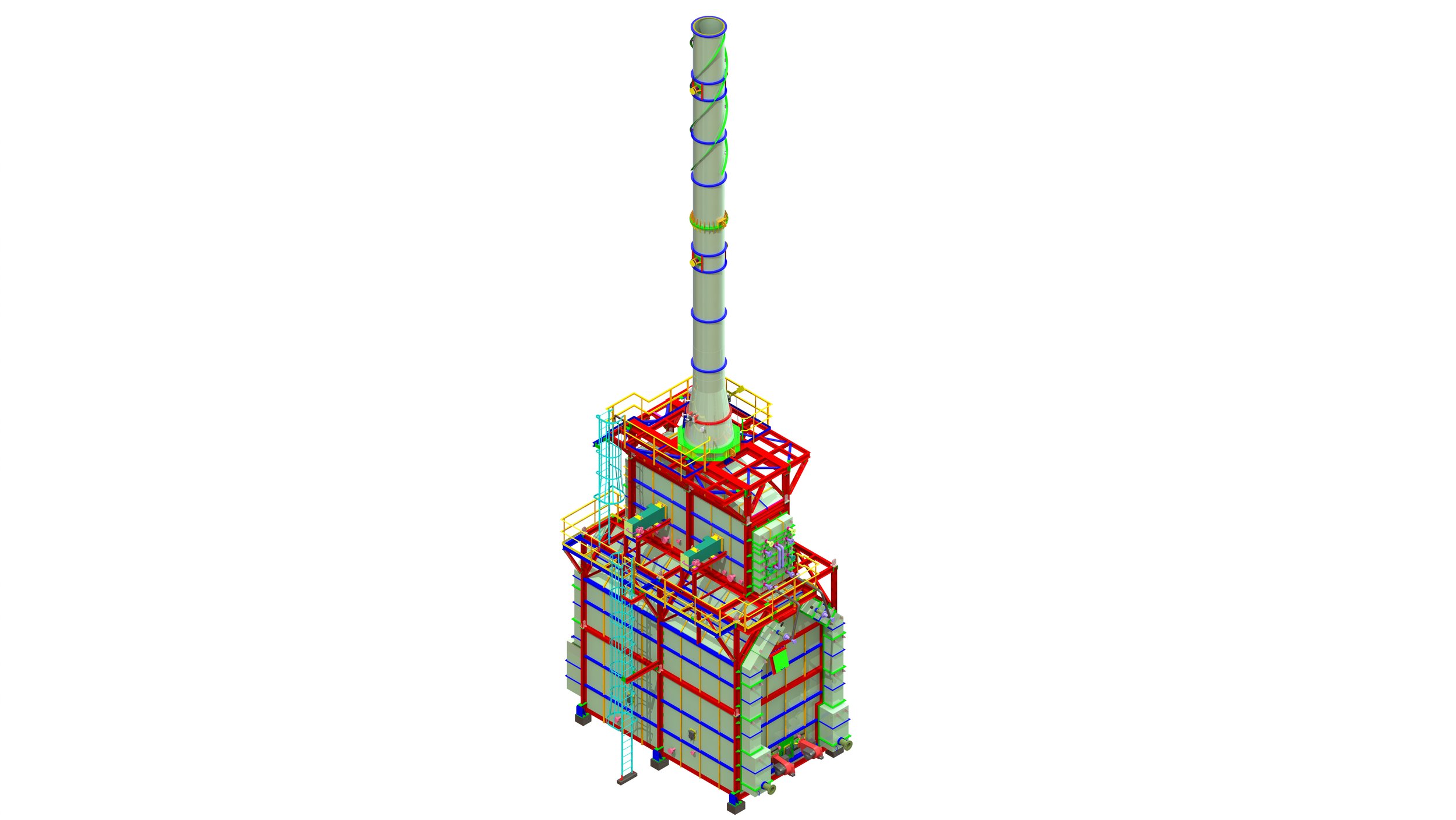Regeneration Gas Heater
Regeneration gas heaters are a type of process heater used in natural gas processing to produce clean and usable gas. Since natural gas is typically saturated with water, it poses risks to equipment and system components. To mitigate this, the gas must undergo dehydration.
This is achieved using desiccants or dewatering agents that absorb moisture and hydrocarbons from the gas stream. Over time, these desiccants become overly saturated and require drying. Regeneration gas heaters provide the necessary heat to vaporize the absorbed moisture and hydrocarbons, allowing the desiccants to be regenerated and reused in the process.
Hot Oil Heater
A hot oil heater, also known as a thermal oil heater, is a device used for indirect heat transfer through a hot fluid. It heats the fluid to a desired temperature and then transfers that heat to various processes without any direct contact between the heating source and the product.
It uses a heating medium, typically a heat transfer oil, which circulates through a closed-loop system. The hot oil absorbs heat generated by the combustion of fuel and then transfers this heat to the required processes or equipment via heat exchangers.
Atmospheric Distillation Heater
An atmospheric distillation heater, also known as a pipe still heater, is a crucial component in a crude distillation unit (CDU) or atmospheric distillation unit (ADU). It is the heating system used to heat the crude oil feed before it enters the distillation tower, preparing it for separation into different hydrocarbon fractions. The main function of the atmospheric distillation heater is to raise the temperature of the crude oil to a point where a significant portion of it will vaporize. This vaporized mixture then enters the distillation tower, where it's separated based on boiling points.
Crude Oil Heater
A crude oil heater is a piece of industrial equipment designed to heat crude oil before further processing in atmospheric and vacuum distillation units to reduce its viscosity, making it easier to transport. Here, heat is transferred to the crude oil via coils installed within a heater vessel using hot combustion gases in a direct-fired system. It's a crucial component in oil refining and production, particularly in operations involving pipelines and fractionating towers.
Vacuum Charge Heater
Vacuum charge furnace is a type of high-temperature furnace mainly used for material processing and heat treatment. It is employed to heat heavy oils in vacuum distillation units, reducing the pressure and boiling point to facilitate separation.
Delayed Coker Heater
A Delayed Coker Heater is a fired heater used in oil refineries to heat heavy residual oil to its thermal cracking temperature. This heating process, which takes place in the heater's radiant tubes, initiates the thermal cracking of long-chain hydrocarbon molecules, producing coker gas oil and petroleum coke.
Visbreaker Heater
Visbreaking is a mild thermal cracking process that lowers the viscosity of the residual oil without significantly changing its boiling point range, making it more suitable for use as fuel oil or for blending with other lighter distillates.
A visbreaker heater is a furnace-like device used in oil refineries to heat heavy oil residues, breaking down large molecules into lighter, more valuable products like heating oil and diesel to reduce the viscosity of heavy oils, making them easier to handle and process.
Hydrogen Reformer Heater
A hydrogen reformer heater is a crucial piece of equipment in the process of producing hydrogen and synthesis gas from hydrocarbons, such as natural gas. These heaters, typically using steam reforming technology, employ high-temperature heat (800-1000°C) to convert hydrocarbons into hydrogen and carbon oxides. The reformer tubes within the furnace are designed to withstand these extreme temperatures and pressures, often exceeding 1,000°C and 3 MPa.
Hydrocracker and Hydrotreater Heaters
Hydrocracker and hydrotreater heaters are crucial components in petroleum refining, responsible for heating the feedstock before it enters the reactors. These heaters prepare the oil for hydroprocessing, which involves using hydrogen and catalysts to refine the oil into usable products like diesel, gasoline, and jet fuel.
Hydrocracking heaters, typically used in hydrocracker units (HCU), heat heavy oil feedstocks and a hydrogen stream to high temperatures and pressures to break down complex hydrocarbons into simpler, more useful fuel components like gasoline and jet fuel. On the other hand, hydrotreater heaters, found in hydrotreater units (DHT), heat diesel feedstocks and a hydrogen stream to moderate temperatures and pressures to remove impurities like sulfur and nitrogen.
Reboiler Heater
A reboiler heater is a heat exchanger that vaporizes a liquid feed from the bottom of a distillation column to generate vapor. This vapor is then introduced into the column, where it helps separate the different components of the mixture based on their boiling points. It plays a crucial role in distillation processes by providing the vapor needed to drive the separation of different compounds.
Platformer Heater
A "platformer heater" refers to a type of fired heater, typically used in industrial processes like refining, which heats a process fluid (oil or gas) to achieve a specific temperature or state. Platformer heaters are often used in petroleum refineries to heat hydrocarbons, such as naphtha, during the platforming process, where the hydrocarbons are converted into gasoline or other valuable products. These heaters are designed to handle large volumes and high temperatures and are often customized for specific applications.













